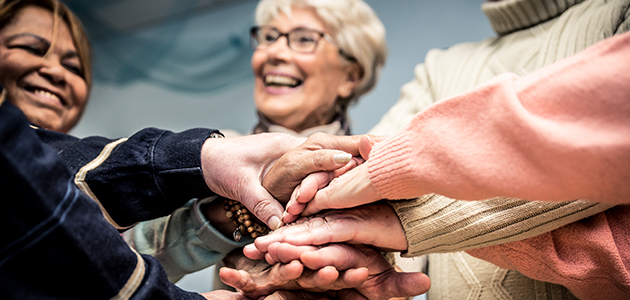
Think about the last time you had a long, chatty visit with a good friend or neighbor. Remember how being with that person made you feel, and try to recall how long those happy feelings of pleasure and contentment lasted after your visit was over.
Odds are those happy feelings lingered throughout the whole rest of the day – perhaps even longer. Why? Because our brains are wired to be engaged with others. Quite simply, we were built for social connectedness.
When we’re younger it’s relatively easy to stay connected to the people around us. In addition to possibly being healthier and more physically mobile, and therefore more able to get out to visit friends and family members, we are also thrust into social situations because of work and parental obligations.
As we age, circumstances and health issues can mean that we interact with others less frequently. This isn’t just an unfortunate situation – it’s one that can actually impact our health. Studies have shown that seniors who have more frequent social activity have lower levels of disability in several areas.1 That means they may be able to live independently longer than those who are less social. Not only that, staying connected may reduce the risk of Alzheimer’s disease, cardiovascular problems, osteoporosis, rheumatoid arthritis, and some cancers – and can even boost your immune system.2
If you’re planning to age in place, staying engaged with your community is something you may have to make an extra effort to do since you won’t have the advantage of a retirement residence creating social opportunities for you. But looking for ways to reach out and enjoy the pleasure of others is the fun part!
Consider these ideas as you look for ways to stay connected to the people around you:
- Lend a helping hand. You have a lot to offer to the people around you, and it’s possible that you have more time to give than younger folks too! Your community may need the skills you have, and getting out to help others will keep you active and engaged – and feeling great about your ability to give back. Look into volunteer opportunities through MyForesters.com, or check with your place of worship or a charitable organization you would like to support.
- Get some exercise. The benefits of regular exercise as we age are well known and include reducing your risk of coronary artery disease, reducing your risk of developing type 2 diabetes, and increasing your strength, power and flexibility.3 But you don’t have to spend hours at the gym by yourself to enjoy physical activity. Get fit and have fun by joining a mall-walking group or simply invite a neighbor for a regular afternoon stroll around your community.
- Try to track down old friends. If you’ve been wondering where some of your old friends are and what they’ve been up to since you last heard from them, the Internet may be able to help you find them.
- Connect online. Nothing beats an in-person chinwag, but connecting with like-minded people through online forums is still a wonderful way to reach out, learn about new people and new ideas, and make friends. Sites like Senior Chatters and Buzz 50 are set up specifically for older folks to connect and chat. As with any online communication, be cautious about divulging your personal information to strangers and read all the fine print to make sure that you’re comfortable with the website’s terms and conditions.
- Start a community of new friends. If time and circumstance has whittled down your circle of friends, bulk it back up!
- Meet your neighbors. The people right in your own building or on your street can end up being an incredible source of support as you age, making it easier for you to stay in your home as long as possible. Reach out and get to know them.
- Look to your place of worship. Many religious organizations have activities and clubs for retired members. Seniors can enjoy field trips, tea and coffee hours, and other fun events with their fellow members.
- Join – or create – a club. Check with your local community center or place of worship to find out about book clubs, garden clubs, art clubs, and other senior-focused groups in your area. If you don’t find anything you’re interested in, start a club of your own!
- Explore your creative side. Consider taking an art class or joining a community choir or local theatre group. Art therapy is a recognized way to enhance physical, mental and emotional well-being – plus it’s just great fun to get messy with a palette of paint or a blob of clay, or to sing your heart out with other music lovers. Many art centers begin new classes in January, so now is the perfect time to do a bit of research and find something creative to enjoy.
Sometimes our world can start to shrink as we age. Making an effort to expand your circle by meeting new people and enjoying new experiences can help you stay more physically active and keep your mind engaged and learning. You’ll also find yourself with a larger group of people who can offer you the kind of support you may want and need to help you continue living independently for as long as possible.
SOURCES
1 https://greatergood.berkeley.edu/article/item/how_social_connections_keep_seniors_healthy
2 https://www.asccare.com/benefits-of-being-social/
3 https://www.membershipmatters.com/healthy-living/how-to-get-fit-over-50/
416894B CAN/US (01/19)




